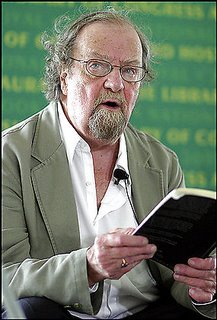 A TRIBUTE TO DONALD HALL, POET
A TRIBUTE TO DONALD HALL, POETDonald Hall was recently appointed to be the Library of Congress’s 14th Poet Laureate Consultant in Poetry. “Hall was born in Connecticut in 1928. He was educated at Harvard, Oxford and Stanford universities and taught at the University of Michigan at Ann Arbor. For the past 30 years he has lived on an old family farm in rural New Hampshire, in the house where his grandmother and his mother were born. He has two children and five grandchildren.” —a Library of Congress press release. (Photo Credit: By Larry Morris—The Washington Post) >>>
Not too long ago I was fortunate to find a collection of Hall’s poems in the little book store where I volunteer, selling books for the Friends of the Library to make money to donate to the Spokane Public Library. Next to the algebra I’m working on, I’m slipping a little reading in of Donald Hall’s poetry. Here's a few of them.
Once upon a time, as a poet, I knew the following well about poems, but that was, O, so long ago.
THE POEM
It discovers by night
what the day hid from it.
Sometimes it turns itself
into an animal.
In summer it takes long walks
by itself where meadows
fold back from ditches.
Once it stood still
in a quiet row of machines.
Who knows
what it is thinking?
This is a poet I imagine very personally as Donald Hall himself. I see a little of myself in it too.
THE CHILD
He lives among a dog,
a tricycle, and a friend.
Nobody owns him.
He walks by himself, beside
the black pool, in the cave
where icicles of rock
rain hard water,
and the walls are rough
with the light of stone.
He hears low talking
without words.
The hand of a wind touches him.
He walks until he is tired
or somebody calls him.
He leaves right away.
When he plays with his friend
he stops suddenly
to hear the black water.
As a poet with an MFA, a child born in the depression with depression stories ringing in my ears and limbic system, who spent almost all his working years running machines as a machinist in factories, shipyards and small job shops, the next poem rings a thousand sad bells with me.
THE FOUNDATIONS OF AMERICAN INDUSTRY
In the Ford plant
at Ypsilanti
men named for their
fathers work at steel
machines named Bliss,
Olaffson, Smith-Crieg,
and Safety.
In the Ford plant
the generators
move quickly on
belts, a thousand now
an hour. New men
move to the belt when
the shift comes.
For the most part
the men are young, and
go home to their
Fords, and drive around,
or watch TV,
sleep, and then go work,
toward payday;
when they walk home
they walk on sidewalks
marked W
P A 38;
their old men made
them, and they walk on
their fathers.
Here’s a poetry test. Donald Hall now lives in New Hampshire and another great American poet spent a good part of his life teaching in New Hampshire. What poet does the rhythm of the phrase “a quarrel of vines” echo from in Donald Hall’s next poem? Do you know?
NEW HAMPSHIRE
A bear sleeps in a cellarhole; pine needles
heap over a granite doorstep; a well brims
with acorns and the broken leaves of an oak
which grew where an anvil rusted in a forge.
Inside an anvil, inside a bear, inside a leaf,
a bark of rust grows on the tree of a gas pump;
EAT signs gather like leaves in the shallow
cellars of diners; a wildcat waits for deer
on the roof of a car. Blacktop buckled by frost
starts goldenrod from the highway. Fat honey bees
meander among raspberries, where a quarrel
of vines crawls into the spilled body of a plane.
No comments:
Post a Comment